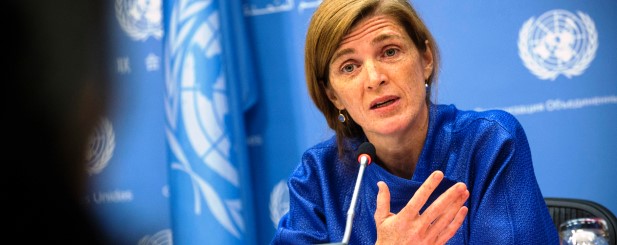(Ambassador Samantha Power at the Open Government Partnership Global Summit in Mexico City)
Finally, I just want to conclude with an example — a very concrete example. In January 2015, the people of Sri Lanka went to the polls to elect a new president. The incumbent Rajapaksa administration had governed largely through divisiveness and fear, and it had persecuted critics. Meanwhile, the challenger Sirisena ran on a platform of open government, anti-corruption and reconciliation. As you all know, the Sri Lankan people chose President Sirisena.
The new government moved swiftly to show it was serious about living up to its commitments, from stopping harassment of human rights defenders and journalists, to exposing rampant corruption. The impact was immediate. A labor organizer who had gone into hiding during the Rajapaksa administration’s rule resumed his work, saying he no longer feared being targeted for what he was doing. A journalist who had been routinely harassed for his reporting said, “the fear has gone.”
But in many ways, that was the easy part. Because walking the walk of open government means not only refraining from muzzling one’s critics and refraining from stealing public resources, but finding ways to empower citizens so they can use their greater freedom to shape the government they want. And that’s why it’s so encouraging that, at the same time it’s confronting some of the darkest and most painful chapters in its country’s past, the Sirisena administration is also pursuing initiatives to open itself up to greater scrutiny. An access to information law is currently being considered in parliament; Sri Lanka’s information technology agency is working to bring connectivity to marginalized communities, who too often have lacked access and the information it provides; and, today, Sri Lanka has joined OGP, one of several new members. None of these tools is transformative in and of itself. But together with other steps, they can help enable citizens to play a greater role in shaping the government they deserve.
The experience of Sri Lanka, I think, embodies so much of what is at stake in this enterprise. It shows us the profound costs of impunity and corruption. It shows how a determined and persistent civil society that would not give up can swing the pendulum back toward greater accountability and transparency. And it shows how much leaders can achieve, even in a short period of time, when they are willing to engage the people they serve.
But I close with this example not because of all it has achieved, but because of all the challenges that lie ahead. As it works to deliver on its ambitious platform of reform, the Sirisena government has a lot to learn from the fellow governments of OGP. Just as we will have a lot to learn from it. As Sri Lankan civil society asserts an increasingly active role in shaping its government’s actions, one of its greatest resources will be the counsel of the civil society organizations in this room. And this is a tremendous resource that just a few years ago did not exist, for a government making a transition like Sri Lanka is attempting.
That is what OGP offers not only to new members like Sri Lanka, but also to governments like mine in the United States, which have been part of this partnership since its inception. You will see U.S. officials running around, taking notes, stealing, plagiarizing the best ideas from countries that are presenting what they have been up to. We have so much to learn, and that is why we are so deeply committed to making OGP as vital, innovative and impactful as ever, without departing also from our founding principles.
( Excerpts form the remarks by Ambassador Samantha Power at the Open Government Partnership Global Summit in Mexico City, October 28, 2015)
